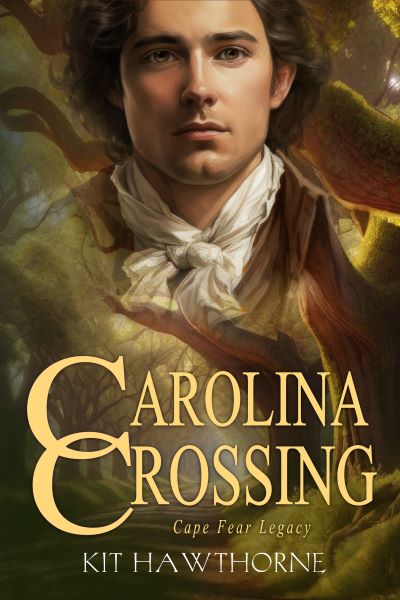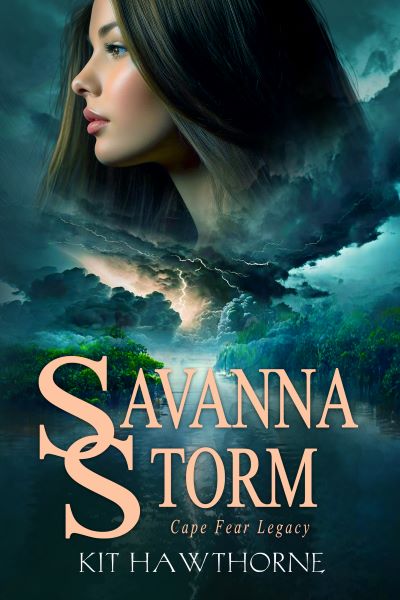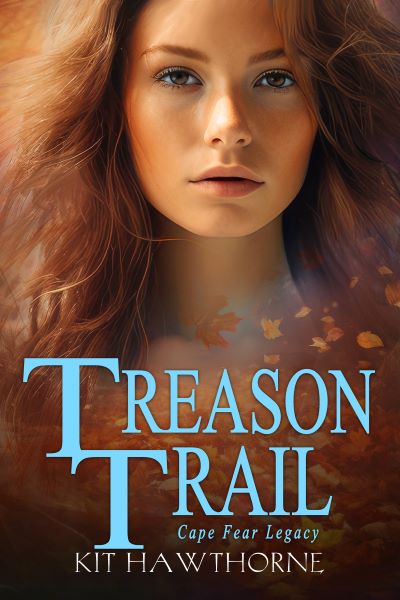The smell of horse and leather and neatsfoot oil calmed him instantly. He took off his frock coat, loosed his neck stock, and turned up his cuffs, then unhitched Boudicca and gave her a brisk rubdown. While she ate her oats, he wiped the harness and leathers and hung them on their racks.
The work was finished too soon. Fergus didn’t want to join the others, didn’t want to hear what fresh outrages Miss Bryant was visiting on his family.
Perhaps this would be a good time to give the carriage a thorough cleaning.
With a bristle brush he cleaned sand and grit from the underside and wheels, then wiped down the body with a soft rag. He worked slowly, lovingly, losing all sense of time, until he heard footsteps.
“I’ll be along presently,” he said without turning.
“Very well, but you’d better hurry if you want anything to eat other than oats and bran mash.”
It was Miss Bryant’s voice.
“Nessa sent me to call you in to dinner,” she said. “Well, she told Morna to do it, but I said I’d go. My, aren’t you a careful horseman?”
Fergus didn’t answer. He ran his rag into the carriage’s grooves to remove all traces of dirt. Maybe if he ignored her, she’d go away.
Then he heard her walking toward Boudicca’s stall. He turned to warn her off, but saw her moving slowly and quietly. Boudicca pricked her ears forward in calm interest and sniffed the visitor. Miss Bryant gave her a good scratching under the mane and murmured to her in a low, loving tone.
Well, she knew how to approach a horse, at least.
“I saw the geldings in the paddock,” Miss Bryant said. “Handsome fellows. Are they brothers?”
“Aye. The grullo is Hector, and the black is Bran.”
“And what is this lady’s name?”
“Boudicca.”
“After the Celtic queen?”
Fergus glanced up. “Aye. Not many know that.”
“Well, I may be a bit more distant from my Celtic roots than your family, but I do read. I know about Hector too, and Bran the Blessed. All very martial names.”
“True. Bran’s two years old now, and he’s getting martial training.”
“Cavalry?”
“Light infantry. He’ll carry me and my gear to battle and home again. Not as demanding as cavalry work, but he must learn not to bolt at the sound of gunfire. ’Twill be a boon to me to have him trained. Soldiers who provide their own mounts and weapons are allowed a shorter enlistment period.”
There was no need to elaborate. Everyone knew about the shortages plaguing the Patriot forces—of horses, men, arms, gunpowder, and money. Fergus was tired of hearing and talking about it. How the Patriots had managed to hold out as long as they had was a marvel.
Miss Bryant laid her cheek against Boudicca’s and curved her arm under the horse’s neck. “The British brought horses with them from New York to the South last December—enough for the Light Dragoons, the Jaegers, and the mounted portion of the Legion. The voyage was rough, and not many of the horses reached the shore alive. Perhaps they drowned in the holds of sinking ships, or had their legs broken in rough seas, or were blown so far off course that their food and water ran out. Perhaps all three.”
Fergus laid his rag aside. Miss Bryant’s face was closed and still, her lashes casting a fringed shadow on her cheeks, as she combed her fingers through Boudicca’s mane. “Do you know, Mr. Shaw,” she said, “there were over a hundred and fifty Americans killed in the Charlestown siege—soldiers and civilians—and around a hundred British. But it is the horses that haunt me. I think of them being led onto those New York transports, trusting and obedient, never to see green grass or open sky again.”
“I think of it too,” said Fergus. “Of the use and misuse we make of beasts in war, I mean. I sometimes wonder if ’tis wrong of me to train Bran as my infantry mount, knowing what harm could come to him. But if I don’t, and we lose the war, what’s to happen to him, or to me and my family? Nay, we must do all we can to win as quickly as possible, and poor Bran must do his part.”
Miss Bryant sighed. “You needn’t justify it to me, Mr. Shaw. I know the hard choices we must all make in time of war.”
“How did the British replace the mounts they lost in the voyage?” Fergus asked.
“Stole as many as they found on farms and plantations, and then—you’ve heard of Banastre Tarleton’s Legion? They attacked the American cavalry and militiamen who were guarding the upper reaches of the Cooper, north of the city. Fifteen Americans killed, eighteen wounded, sixty-three taken prisoner—and ninety-eight fine American horses driven off. Good cavalry mounts, probably better than those the British had lost on the voyage. And with the American cavalry neutralized, the British were free to plunder the lands east of the Cooper, raping and despoiling. Aye, Mr. Shaw, I said rape. That’s the proper word for it. You needn’t look shocked. I detest polite figures of speech. There’s no sense using a teaspoon to do a spade’s work.”
Fergus didn’t know what to say. He knew the ugly things men did in war, but he couldn’t realize them in his heart. He didn’t like to think how thin was the veneer of civilization, or how easily it could be peeled back.
“’Tis a shame about the lost cavalry mounts,” he said at last.
“Aye, shame is the right word for it. ’Twas the militia’s fault.”
“How so?”
She shrugged. “It is always the militia’s fault. They were present, therefore they failed.”
“But we cannot be sure how the Patriots were disposed, or their attackers.”
“I beg your pardon, we can be perfectly sure. An alarum was raised, the militia fled, confusion ensued, and the British won the day. The militia disappoint whenever they are relied upon. That is the one thing they can be depended upon to do.”
“Ten to one they were wretchedly armed,” Fergus said sharply, “with no powder in their muskets, or no muskets at all. Sometimes all they have is homemade axes and broadswords.”
Miss Bryant made a scoffing sound. “I’m sick of hearing excuses for the militia. The truth is they’ve performed miserably time and again. They simply cannot hold their ground when fired upon.”
“Hold their ground when…” Fergus stood. “Miss Bryant, have you ever been fired upon? Have you stood shoulder to shoulder with other men, facing a wall of soldiers a hundred times better armed and better trained than you’ll ever be? Have you seen the clouds of smoke, and heard the gunfire and the cries of men falling around you, while awaiting your own order to fire? How well do you think you’d hold your ground in such a case?”
“’Tis immaterial how well I could do so. I am not a militiaman. Is it hard, to maintain discipline while firing and being fired upon? I daresay, but that is the militia’s job. And they’ve failed at it, over and over, like your own Wilmington militia last year at Brier Creek. Their failure is what made the British invasion of South Carolina possible. They turned tail and fled—all the way back to North Carolina, by some accounts.”
“Some fled, aye. Others were sliced open by British bayonets, or drowned in the swamps. I wasn’t there, but two friends of mine were killed in the battle. The men were badly led and badly supplied. General Ashe had chosen a death trap of a camp site, with its back to the creek and no escape route—”
“Badly led, badly supplied, badly situated. So say all who fail to deliver what is required of them. The truth of the matter is, militia units are inadequate for major engagements. They do well enough for fatigue details, but they’re worthless under fire.”
Anger rose hot in Fergus’s chest and face, and his voice shook as he said, “One of those fatigue details, Miss Bryant, was the construction of breastworks to defend your city, and one of the worthless men doing it was my father.”
The light suddenly dimmed. Fergus turned and saw his fourteen-year-old sister, Morna, standing in the doorway, blocking the incoming sunshine. Her eyes were round with shock.
“Catalyn says to tell you both to come to dinner,” she said in a small voice, then hurried away, her red ringlets fluttering behind her.
Miss Bryant gave Fergus one last lofty look, then followed Morna out like a schooner carrying full sail.
Return to Carolina Crossing







